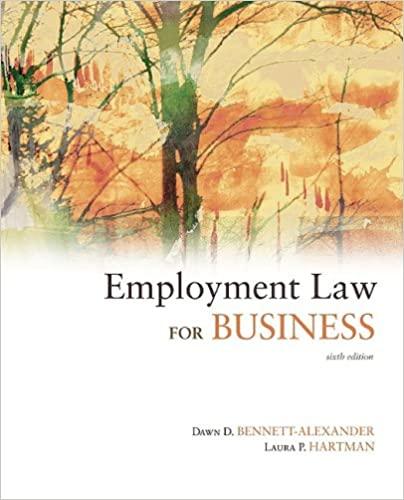Question
Carlton Linens supplies bedding, towels, tablecloths and other linens to the hotel and hospitality industry. It is acompetitive industry with many suppliers trying to win
Carlton Linens supplies bedding, towels, tablecloths and other linens to the hotel and hospitality industry. It is acompetitive industry with many suppliers trying to win the business of major hotels chains.
Carlton often has many offers to sell linens to potential hotel and restaurant customers pending at the same time. This isnecessary to secure enough volume of business in a fast-moving industry. Carlton is fortunate to have a strongrelationship with the Richmond Hotel Group (RHG), a major hotel chain. RHG accounts for nearly half of Carlton'ssales. RHG is fully aware of its importance to Carlton's business, and likes to "throw their weight around" when it suitstheir purposes. Recently, RHG has made life difficult for Carlton in their contracting practices. In one case, Carltonmade RHG an offer for linens for a Chicago hotel, and RHG simply refused to commit, delayed, and refused to eventake calls regarding this purchase. Carlton got tired of waiting and contracted to sell the product a Toronto hotelinstead. Suddenly, RHG accepted the Chicago offer for the same product, and Carlton had to scramble to findadditional product at very high cost to fulfill both contracts. In the end, performing both contractsled to a big loss.
Carlton also had been negotiating with RHG for the bedding for a new hotel being built near the Atlanta airport. Carltonhad offered very aggressive pricing, but only if RHG would accept quickly, so Carlton could lock in favorable pricesfrom its suppliers. Carlton's offer had a very clear deadline, which RHG appeared to have missed. But - wouldn't youknow! - an "acceptance" of the offer arrived in the US mail a week later, dated before the deadline. RHG maintainsthat the acceptance was made before the deadline and thus valid, but RHG is unable to explain the delay. Prices havenow gone up with Carlton's bedding suppliers, so the deal will provide almost no profit to Carlton. Not wanting toalienate such an important customer, so Carlton honored the terms of the Atlanta offer (even though you believeCarlton's offer had expired before any acceptance, and thus no legally binding contract ever was created). This stinks!But . . . since Carlton cannot simply refuse to do business with RHG - its biggest and best customer -- Carlton willhave to tighten up its own contracting practices in future deals.
In a cost-cutting move, Carlton decided to eliminate the position of their general counsel. Contract management hasnow been assigned to YOU, Assistant Vice President of Operations.
Contract law supplies the contracting parties with tools to protect themselves in bargaining - IF you know the rules andare able to use them to your advantage. Your job is to advise Carlton's CEO on strategies to use the available legalrules to Carlton's advantage in drafting future offers to RHG. Use the legal rules to AVOID these types of problems inthe future dealings with RHG. (Your answer should NOT discuss the outcome of the PAST problems with the Chicagoand Atlanta contracts - which are settled and in the past - but you should focus only on avoiding future problemsthrough more effective contracting practices, using the legal rules to YOUR advantage). Your goal is to keep ALL ofRHG's business, but without repeating ANY of the past contracting problems. Also, there may be very little that youcan do to change RHG'S behavior, something you have NO control over. Instead focus on what you CAN control -CARLTON'S contracting behavior.
This problem asks you to ANALYZE the past contract formation problems that arose, and determine how to changeyour FUTURE BEHAVIOR to take advantage of the legal rules that will help you to avoid these problems. To do so,you must analyze the legal rules that apply and determine how to USE THE RULES to construct future contractingscenarios that will benefit you and avoid these problems. Cite the relevant rules that support your recommendations inyour answer.
Note: Focus only on the contracting process, not on business "deal terms", such as pricing incentives or penalties,delivery changes etc. Assume all performance terms will be unchanged, but the process at arriving at those terms willbe done it a way that legally protects Carlton's interests.
Notes 1) Be sure to answer the question asked in the problem. This problem is about the process of reachingmutual assent. It is not about the content of the promises exchanged
2) This is a law class, and this is a law problem. You answer should be based in law, and you shouldreference principles of law to support your answer. It should be apparent at all times what legalprinciples support your answers.
3) This problem is only about the mutual assent process. There are many other factors that affect contract formation - things like legality, capacity, consideration, genuineness of assent, and other issues.
4) Provide solutions to the mutual assent process issues that are based in law, and do not focus onimproving the "business terms" - improving pricing terms or methods, requiring deposits or offering discounts or other finance benefits, improving terms for product delivery, installation or other performance or operations benefits, giving Carlton unilateral ways to bail out of its promises and shift all risks to its counterparties (who would ever agree to these - you will lose RHG's business!). Assume that all such "business terms" will be pretty much the same before and after implementing your mutual assent process changes -- but of course the business terms are irrelevant ifyou mess up the process of reaching agreement and don't end up with an enforceable contract.
Step by Step Solution
There are 3 Steps involved in it
Step: 1

Get Instant Access to Expert-Tailored Solutions
See step-by-step solutions with expert insights and AI powered tools for academic success
Step: 2

Step: 3

Ace Your Homework with AI
Get the answers you need in no time with our AI-driven, step-by-step assistance
Get Started


